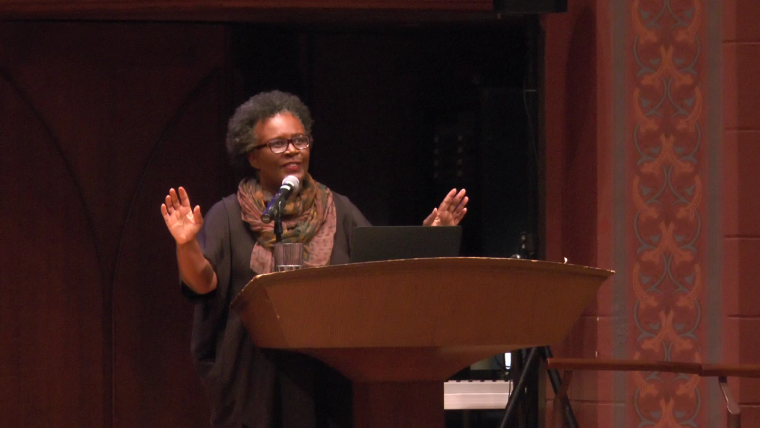Rankine Hon. ’17 Addresses First-Year Students on ‘Citizen’


For this year’s First Year Matters program, incoming new students read Claudia Rankine’s Citizen: An American Lyric during the summer before their arrival on campus.
Rankine, a noted poet and author, had been on campus for Commencement 2017, when she received an honorary degree and addressed the graduating class.
On Sept. 1, Rankine was back at Wesleyan to address the Class of 2021, offering insights into the development of the book. She also entered into a discussion with first-year students, taking questions from the audience, who gave her snaps of approval throughout her talk and a standing ovation at the end.
Kevin Butler, assistant dean of students, who spearheaded this year’s program, noted that the selection committee had chosen Citizen for a number of reasons.
“It is extremely powerful and has thought-provoking passages,” he said. “We thought we could engage both the first-year students and the community at large in some really in-depth conversations on microaggressions, equality and fairness.
“There are very few speakers I’ve seen who have the certain style, voice quality and tone that is engaging and comfortable—even when the questions and answers are difficult,” he added.
In Memorial Chapel that Friday afternoon, Rankine spoke about her choice of images in Citizen and explained her use of the second-person pronoun “you” in addressing the reader as both intimate and as a device that placed each of her readers within the scene she described. Projecting the images she had chosen for the book on a screen behind her, she noted, “I think visual artists have been doing the work of addressing the effects inside racism.
“A lot of language-based people have been talking about the history. Visual artists have been actually inside the job of trying to make apparent the feeling of it. You can also say musicians do that, too, somebody like Coltrane,” she said.
“When I went to work on Citizen, I was really interested in—how do you make a text about this thing of accumulating the day-to-dayness of what it is like to experience these encounters [microaggessions] over and over and over again. I felt, for me, it was really about seeing. … Using the visuals in this book was crucial to the project itself. For me, it was bringing language to meet these visuals.”
As she left the podium, a group of students gathered around her with follow-up comments before proceeding to their small discussion groups, facilitated by professors and administrators.
Dean Renee Johnston-Thornton, who facilitated a group, called this year’s First Year Matters, “a delightful program, well run and smart,” noting that the opportunity to have Rankine on campus made the book “a particularly exciting choice.” Additionally, “It appealed to multiple processing and learning styles. It was visually heavy, it was creative, it was poetic and factual. All those pieces allowed us to find a point around which we could have a conversation. It served as a springboard from which we could enter the conversations, embarking on a journey of self-discovery.”
Professor of Religion and Professor and chair of African American Studies Elizabeth McAlister, another facilitator, also praised Rankin’s work as “speaking to our incoming students with great clarity and force.” She asked her students to recall and share their first memories of race. “Students of color from various backgrounds, as well as white students, came to voice about how and when they realized they were living in a racialized society. It allowed us all to share a profound set of recollections, while acknowledging our different positions. It turned out to be an intimate discussion, in a way—and a positive one.”
University Professor of Letters and Chair of the College of Letters Kari Weil, also a facilitator, was especially impressed by the questions the students asked after the talk, “suggesting how there was a cumulative effect to Rankine’s examples, which paralleled the effects of hearing, day after day, about incidents of racialized brutality,” she said. “Indeed, the event manifested the power of literature and the arts—and of Rankine’s literature in particular—not only to stimulate visceral reactions to matters of prejudice and injustice, but also to inspire productive thinking around those reactions.” Weil noted that a majority of student responses she had read indicated “that they believed Rankine’s writing would inspire them to do what they could to address prejudice on campus during their time at Wes.”
Butler is eager to build on this. “We’re going to implement additional conversations with the larger community around some of the themes of Citizen,” he said.
“We’re at a very interesting place in our history, and I’m hoping we make more informed decisions about how we choose to engage with each other on topics ranging from immigration, to education, to jobs, to citizenship, to equal access for all—men, women, gay straight, black white, doesn’t matter.
“Wesleyan is a place where we can remind ourselves that everyone should be treated equally and fairly.”

